

Important Digitial Media Skills That Employers Value. With the phenomenal growth of the internet over the last decades has come an equally revolutionary growth in the number of jobs available for writers, illustrators, and videographers within the digital media industry. There’s really never been a better time for creative artists with solid digital media skills to find employment, since the public’s appetite for new information presented in unique and original ways is voracious. Active Listening. Active listening is a skill that can be acquired and developed with practice.
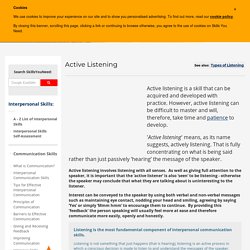
However, active listening can be difficult to master and will, therefore, take time and patience to develop. 'Active listening' means, as its name suggests, actively listening. That is fully concentrating on what is being said rather than just passively ‘hearing’ the message of the speaker. Active listening involves listening with all senses. As well as giving full attention to the speaker, it is important that the ‘active listener’ is also ‘seen’ to be listening - otherwise the speaker may conclude that what they are talking about is uninteresting to the listener. Interest can be conveyed to the speaker by using both verbal and non-verbal messages such as maintaining eye contact, nodding your head and smiling, agreeing by saying ‘Yes’ or simply ‘Mmm hmm’ to encourage them to continue.
Listening is the most fundamental component of interpersonal communication skills. Signs of Active Listening Smile Eye Contact. Skills, Abilities and Keywords to Help You Get Hired. Hard Skills vs Soft Skills: List of Best Examples for the Workplace. Employers look for two kinds of skills: soft skills and hard skills.
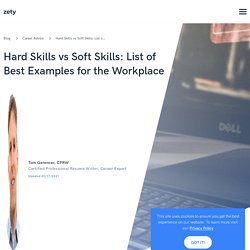
Hard skills show you’re great for a specific job. Nobody is born with them. Three hard skills examples are coding, budgeting, and mixing drinks. Soft skills prove you’d be a great fit anywhere. They’re part of your personality, but you can learn them. Skills inventory worksheet. Organizational Skills List with Examples. Organizational skills are some of the most important and transferable job skills an employee can acquire. They encompass a set of capabilities that help a person to plan, prioritize, and achieve his or her goals. The ability to keep work organized allows workers to focus on different projects without getting disoriented or lost, thereby increasing productivity and efficiency in the workplace.
Managers look for employees who can not only keep their work and their desk organized, but for those who can also adjust quickly to the organized structure of a company. Organizational Skills for Your Resume. Organizational skills are crucial for many work experiences - so it's imperative that you showcase them on your resume.
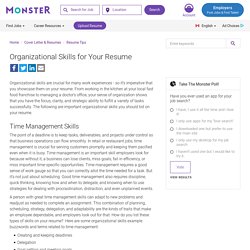
From working in the kitchen at your local fast food franchise to managing a doctor's office, your sense of organization shows that you have the focus, clarity, and strategic ability to fulfill a variety of tasks successfully. The following are important organizational skills you should list on your resume. Time Management Skills The point of a deadline is to keep tasks, deliverables, and projects under control so that business operations can flow smoothly. In retail or restaurant jobs, time management is crucial for serving customers promptly and keeping them pacified even when it is busy. Organizational Skills in the Workplace.
Sample Interpersonal Communication Skills for Resume. Showcasing some interpersonal skills play an essential role in establishing candidates’ employability since almost 90% of professions involve customer dealing in some form or another.
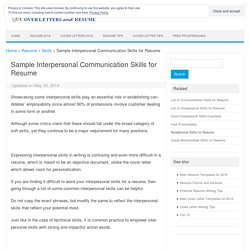
Although some critics claim that these should fall under the broad category of soft skills, yet they continue to be a major requirement for many positions. Expressing interpersonal skills in writing is confusing and even more difficult in a resume, which is meant to be an objective document, unlike the cover letter which allows room for personalization. Examples of Effective Communication Skills. Communication is an essential part of everyday life.
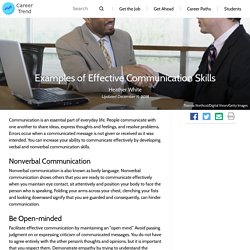
People communicate with one another to share ideas, express thoughts and feelings, and resolve problems. Errors occur when a communicated message is not given or received as it was intended. Communication Skills for Workplace Success. The ability to communicate effectively with superiors, colleagues, and staff is essential, no matter what industry you work in.
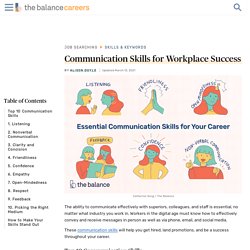
Workers in the digital age must know how to effectively convey and receive messages in person as well as via phone, email, and social media. These communication skills will help you get hired, land promotions, and be a success throughout your career. Examples of Skills. Skills are the expertise or talent needed in order to do a job or task.
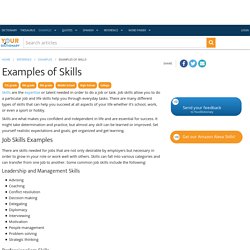
Job skills allow you to do a particular job and life skills help you through everyday tasks. There are many different types of skills that can help you succeed at all aspects of your life whether it's school, work, or even a sport or hobby. Skills are what makes you confident and independent in life and are essential for success. It might take determination and practice, but almost any skill can be learned or improved. Set yourself realistic expectations and goals, get organized and get learning. 5 Awesome Communication Skills to Highlight on Your Resume.
Competencia digital. Top 10 Soft Skills Employers Love: 90+ Examples. The Key Skill Employers Want In Student And New Grad Hires. Working with people means working with their emotions.
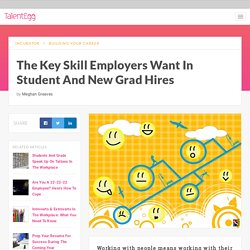
Need proof? It’s pretty hard to find a job description that doesn’t mention strong interpersonal, teamwork, collaboration or universal communication skills. This is why employers are putting a big emphasis on finding employees who have strong “emotional intelligence.” Whatever industry you plan on working in as a student or new grad hire, high emotional intelligence is never a bad thing. Read on to get the inside scoop on this skill. What is emotional intelligence? Emotional intelligence is a mix of various components, each of which has to do with how you interpret and engage with your emotions. Acknowledging emotions: This means acknowledging not only your emotions but the emotions of those around you as well.
Understanding emotions: There will be times during your career when people will upset you without realizing that they have done so. Strengthening your emotional intelligence But reading and learning about this skill isn’t enough.